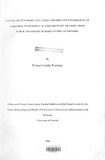| dc.contributor.author | Wairuri, Cecilia W | |
| dc.date.accessioned | 2013-05-02T08:13:50Z | |
| dc.date.available | 2013-05-02T08:13:50Z | |
| dc.date.issued | 2004 | |
| dc.identifier.citation | M.ED (Educational Administration and Planning) Thesis 2004 | en |
| dc.identifier.uri | http://erepository.uonbi.ac.ke:8080/xmlui/handle/123456789/18273 | |
| dc.description | Master of Education Thesis | en |
| dc.description.abstract | Teachers play a key role in maintaining discipline within a school. This may be due to the
fact that teachers spend most of their day with the students as compared to the time the
students spend with their parents. Teachers enforce discipline in various ways including
reward and punishment. Corporal punishment has been an integral part of the discipline
until recent times when social scientists have disagreed on its effectiveness as a
disciplinary measure. Other stakeholders have voiced their opinions on the cane hence
the controversy on this issue.
In Kenya, the use of corporal punishment was legalised in 1972 under the Legal Notice
No 40 of 1972 (Republic of Kenya, the Education Act 1972). However, the ban on
corporal punishment in schools has been under discussion since 1992 when the Ministry
of Education issued a circular banning corporal punishment in schools but head teachers
ignored it. In March 2001, the government of Kenya through the Ministry of Education
had to issue another circular banning corporal punishment in Kenyan schools.
The purpose of this study was to examine the attitudes of teachers in the use of corporal
punishment as well as its ban. The study also sought to find out the kind of discipline
problems, which were handled using the cane prior to its ban. The study further sought to
establish whether these teachers who were caned as students had their attitude influenced
by their earlier experiences. Finally the study sought to find out whether the ban on the
cane should be lifted.
The supervisor validated the research instrument used on the eight public secondary
schools. Of the 200 questionnaires issued, 162 were completed and returned.
The main findings from the study were;
1. Most teachers in public schools in Kikuyu Division felt that corporal punishment
is an effective disciplinary measure
2. Corporal punishment was popular in solving serious and petty offences prior to its
ban.
3. Most teachers attributed the recent spate of strikes and unrest 111 secondary
schools to the ban on corporal punishment.
4. There are few teachers with training in guidance and counselling skills other than
child psychology that they learnt during their training as teachers.
Conclusions were drawn from the analysis of the data and testing of the stated
hypotheses:
1. Teachers in the public secondary schools had a positive attitude towards corporal
punishment.
2. Teachers did not support the ban of corporal punishment and attributed the
increased indiscipline in schools to this ban and recommended the reinstatement
of corporal punishment.
3. Demographic variables such as age, professional experience and academic
qualification did not affect teachers' attitude towards corporal punishment.
The following recommendations were put forward
1. Since government policies on education elicit diverse attitudes from teachers who
are key stakeholders in education, the teachers should always be consulted
whenever the government intends to change any policy affecting education.
2. Corporal punishment should be reinstated and its use controlled by the Ministry of
Education because the teachers attitudes towards it is positive
3. More teachers be trained in guidance and counselling to handle some discipline
problems like drug abuse. | en |
| dc.description.sponsorship | University of Nairobi | en |
| dc.language.iso | en | en |
| dc.title | A study on teachers' attitudes towards the withdrawal of corporal punishment as a disciplinary measure from public secondary schools in Kikuyu division. | en |
| dc.type | Thesis | en |
| local.publisher | College of Education and External Studies, University of Nairobi, | en |

